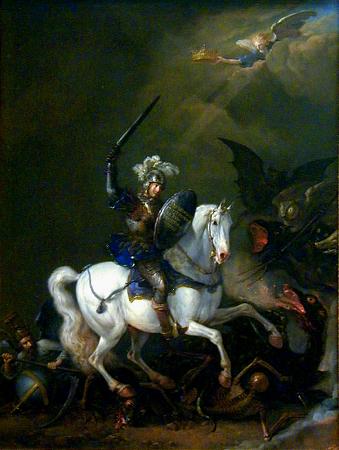Demon. A Demon is a supernatural being, typically associated with evil, prevalent historically in religion, occultism, literature, fiction, mythology, and folklore; as well as in media such as comics, video games, movies and television series. The original Greek word daimon does not carry negative connotations. The Ancient Greek word daimon denotes a spirit or divine power, much like the Latin genius or numen. The Greek conception of a daimon notably appears in the works of Plato, where it describes the divine inspiration of Socrates. In Ancient Near Eastern religions and in the Abrahamic traditions, including ancient and medieval Christian demonology, a demon is considered a harmful spiritual entity which may cause demonic possession, calling for an exorcism. In Western occultism and Renaissance magic, which grew out of an amalgamation of Greco-Roman magic, Jewish Aggadah and Christian demonology, a demon is believed to be a spiritual entity that may be conjured and controlled. Further information: Daemon, Agathodaemon, Cacodemon, Daimonic, and Eudaimonia The Ancient Greek word daemon denotes a spirit or divine power, much like the Latin genius or numen. Daimon most likely came from the Greek verb daiesthai. The Greek conception of a daimon notably appears in the works of Plato, where it describes the divine inspiration of Socrates. The original Greek word daimon does not carry the negative connotation initially understood by implementation of the Koine, and later ascribed to any cognate words sharing the root. The Greek terms do not have any connotations of evil or malevolence. In fact, eudaimonia, means happiness. By the early Roman Empire, cult statues were seen, by pagans and their Christian neighbors alike, as inhabited by the numinous presence of the gods: Like pagans, Christians still sensed and saw the gods and their power, and as something, they had to assume, lay behind it, by an easy traditional shift of opinion they turned these pagan daimones into malevolent 'demons', the troupe of Satan. Far into the Byzantine period Christians eyed their cities' old pagan statuary as a seat of the demons' presence. It was no longer beautiful, it was infested. The term had first acquired its negative connotations in the Septuagint translation of the Hebrew Bible into Greek, which drew on the mythology of ancient Semitic religions. This was then inherited by the Koine text of the New Testament. The Western medieval and neo-medieval conception of a demon derives seamlessly from the ambient popular culture of Late Antiquity. The Hellenistic daemon eventually came to include many Semitic and Near Eastern gods as evaluated by Christianity. The supposed existence of demons remains an important concept in many modern religions and occultist traditions. Demons are still feared largely due to their alleged power to possess living creatures. In the contemporary Western occultist tradition, a demon is a useful metaphor for certain inner psychological processes, though some may also regard it as an objectively real phenomenon. Some scholars believe that large portions of the demonology of Judaism, a key influence on Christianity and Islam, originated from a later form of Zoroastrianism, and were transferred to Judaism during the Persian era. Both deities and demons can act as intermediaries to deliver messages to humans. Thus they share some resemblance to the Greek daimonion. The exact definition of demon in Egyptology posed a major problem for modern scholarship, since the borders between a deity and a demon are sometimes blurred and the ancient Egyptian language lacks a term for the modern English demon. However, magical writings indicate that ancient Egyptians acknowledged the existence of malevolent demons by highlighting the demon names with red ink. Demons in this culture appeared to be subordinative and related to a specific deity, yet they may have occasionally acted independent from the divine will. The existence of demons can be related to the realm of chaos, beyond the created world. But even this negative connotation cannot be denied in light of the magical texts. The role of demons in relation to the human world remains ambivalent and largely depends on context. Ancient Egyptian demons can be divided into two classes: guardians and wanderers. Guardians are tied to a specific place; their demonic activity is topographically defined and their function can be benevolent towards those who have the secret knowledge to face them.
more...





